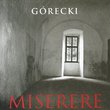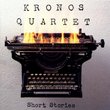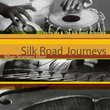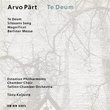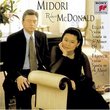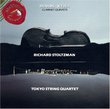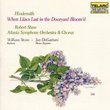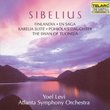| All Artists: Henryk Gorecki, Kronos Quartet Title: Henryk Górecki: Already It Is Dusk (String Quartet No. 1, Op. 62) (1988) / Quasi una Fantasia (String Quartet No. 2, Op. 64) (1990-91) - Kronos Quartet Members Wishing: 0 Total Copies: 0 Label: Nonesuch Original Release Date: 1/1/1993 Re-Release Date: 6/29/1993 Genre: Classical Styles: Chamber Music, Historical Periods, Classical (c.1770-1830) Number of Discs: 1 SwapaCD Credits: 1 UPC: 075597931921 |
Search - Henryk Gorecki, Kronos Quartet :: Henryk Górecki: Already It Is Dusk (String Quartet No. 1, Op. 62) (1988) / Quasi una Fantasia (String Quartet No. 2, Op. 64) (1990-91) - Kronos Quartet
CD DetailsSimilarly Requested CDs
|
CD ReviewsQuasi una Fantasia Vargiu Riccardo James | Bologna, Italy | 12/01/2000 (5 out of 5 stars) "Gorecki's String Quartet No. 2, Op. 64 - Quasi una Fantasia - is an intense and heart stirring composition I have no doubt about rating five stars.There is, however, a preliminary consideration to be made: this piece of music, more than others, asks for cooperation, lots of it, and it will not satisfy listeners who are unwilling to award it with such cooperation. The reason for this, paradoxically, rests in the quartet's overtly simple and stubbornly repetitive inner structure, which is very likely to annoy listeners who either are untrained to minimalist music, or (even more so, perhaps, in this case) believe that simplicity of form essentially entails a lack of ideas. In other words, in order for those approaching Gorecki's Quasi una Fantasia to thoroughly enjoy it (and comprehend it), they must cooperate - that is, suspend skepticism and let the music exercise its hypnotic suggestion on them. If they do not, they'll inevitably miss its point and therefore find it exceedingly simple and consequently discharge it.But now, lets take a closer look at Gorecki's quartet from the standpoint of those who, like myself, through cooperation, allow it to function effectively... Quasi una Fantasia - in my opinion very nearly a "hallucination," rather than merely a "fantasy" - is a well spun, taut web it's hard for one to get out of, once one has fallen into it. In general, it steps forward by means of constant and cumulative repetitions, which gradually produce a snowball effect, inevitably submerging its listeners: very brief themes are reiterated and lengthened in the process, thus leading to immensely long bars, which cause one, literally, to skip a heartbeat. This development is not unaccompanied: deeply-set and never-so-stubborn ostinatos give the piece further cohesion, while swelling its unhealthy, beautifully morbid quality. Although fragments of Polish folk music shed light on the composition, its general mood, as I see it, is rather dark. The third movement, in particular, conveys a sense of gloominess which is so desperate it may be thought of as pure madness. The last movement, however, seems to state that there is hope, and that joy - often unexpectedly - emerges from and defeats anguish." Superb 11/16/1999 (5 out of 5 stars) "If you want to have the myth of "Gorecki the Mystic" dispelled for you, listen to these quartets. They are undeniably thorny works, full of Bartokian fire, polytonality and brutal momentum - used to ends as musically engaging as the Third Symphony, though very different. The Quartet No.1 "Already It Is Dusk" in particular, with its fervent prayer for deliverance underlying its somber chorales and furious dances, is as moving as that former work. "Quasi una Fantasia" is more drawn-out and more enigmatic, with its quiet "Beethovenian" cadences emerging in between earthy folksong and propulsive rhythms. Nonesuch's sound is excellent, and the Kronos are perhaps the ideal interpreters of this music." Context -- A Maker or Breaker Gary Scott | SC | 09/25/2007 (5 out of 5 stars) ""Quasi una Fantasia" is based on a style of traditional Polish folk music that originated in the mountainous south of the country. The bass is played on a cello while viola and violin accompany with a strict 2/4, on-beat staccato rhythm. Meanwhile, the lead violin plays melodies that are simplistic on the first listening, but become incredibly complex in their timing when listened to with an ear for nuance.
What Gorecki has done with QuF is set that style of music in a modern, somewhat atonal mode. If you are unfamiliar with the original style of playing, it might sound a little monotonous. If you're familiar with any Goralski music, you'll smile through the whole piece. " |


 Track Listings (5) - Disc #1
Track Listings (5) - Disc #1
